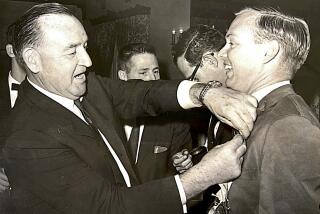California’s recall revolution that wasn’t
- Share via
Monday is the 10th anniversary of the recall of Gov. Gray Davis and the election of Arnold Schwarzenegger. Was it the great watershed in California government that some predicted at the time? Was it a “people’s revolution,” something like Proposition 13, that would trigger a broader national uprising against politics as usual? Was it the great reengagement of an electorate that had been alienated by the mess our leaders had made of things?
Or was the recall none of these things, just a system reset that hardly changed anything?
Here’s one gauge: Gray Davis started his career in state politics as chief of staff in the first administration of Jerry Brown, and guess who is sitting in Davis’ chair now? Arnold Schwarzenegger ended his term in office in 2011 with an approval rating as low as Davis’ was when he was recalled: Republicans hated him as much as the Democrats he called “girlie men” a few years before.
The Davis recall was something that probably could have happened only in California. Because anyone who collected 65 signatures and ponied up $3,500 could get on the ballot as a possible successor, there were 135 candidates — a great land rush of hopefuls, some of them serious, some of them just clowns in this political circus. Sometimes it was hard to tell them apart.
Schwarzenegger deserves some credit for briefly elevating the salience of global warming as the major issue it deserves to be, but it has almost vanished again in our political discourse.
While he was governor, in 2010, voters passed Proposition 25, an initiative lowering the margin necessary in the Legislature to approve a budget from two-thirds to a simple majority. That was probably the most important step in years in reforming the dysfunctional system that California had been locked into, but it was hardly enough.
And it wasn’t Schwarzenegger’s doing. He denounced it as a sneaky attempt by Democrats to raise taxes, even though it maintained the two-thirds rule for that function.
To his credit, Schwarzenegger warned his party that because of its self-imposed ethnic and social narrowness, it wasn’t, as he put it, “filling the seats.” That was obvious when he said it in 2007, and it became even more obvious after the 2012 election when the Democrats briefly won supermajorities in the Assembly and the Senate.
Much of Schwarzenegger’s term in office, however, was an era of missed opportunities. He intended to “blow up the boxes” in state government, and, given his visibility and influence when he was elected, he might have accomplished a great deal in reforming the system. The need for reform — the seniority system in teacher contracts, the costly pension systems for cops and firefighters, the cumbersome environmental rules — was obvious.
But the propositions he put forward in 2005 — caps on state spending, limitations on teacher tenure and a ban on the use of union dues for political purposes — were overkill, vehemently opposed by the unions and rejected at the polls by the voters.
Although Schwarzenegger won reelection in 2006, by then the chance was probably gone. Indeed, it may have been gone from the first day, when he canceled the vehicle license fee increase Davis had approved, and thus enlarged the state’s gaping budget deficit by $6 billion by the time he left office.
And in talking like anti-tax crusader Grover Norquist about “starving the monster” of government, and about how spending alone, not revenue, was the problem, he backed himself even further into a political corner. Neither could be solved without addressing the other. As for the rest of his governorship, it was mostly showmanship and glitz.
Gov. Jerry Brown’s restrained approach, the majority budget rule and the recovering economy have brought California back from the brink of fiscal crisis. But much of the mess remains: unfunded public employee pension and retiree healthcare obligations; the hefty tuition charges at the state’s increasingly privatized public universities; the under-maintained roads and bridges; schools that still lag the nation both in resources and performance.
The major changes of the last decade have been in the state’s election system. Redistricting is now in the hands of an independent commission, not the Legislature, and California has a nonpartisan top-two primary system, both of which Schwarzenegger strongly supported. And it’s possible that, since the Republican wipeout in the 2012 election, the state GOP is finally beginning to heed Schwarzenegger’s old warning.
But little of the speculation about revolutionary change has been borne out. We’re in better shape than we were, and the nation has changed, but not because Davis was booted out and Schwarzenegger was voted in.
Peter Schrag, the former editorial page editor of the Sacramento Bee, is the author of “Paradise Lost: California’s Experience, America’s Future” and “California: America’s High-Stakes Experiment.”
More to Read
A cure for the common opinion
Get thought-provoking perspectives with our weekly newsletter.
You may occasionally receive promotional content from the Los Angeles Times.






